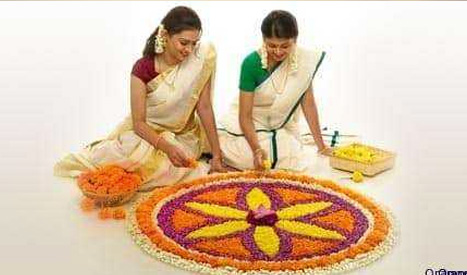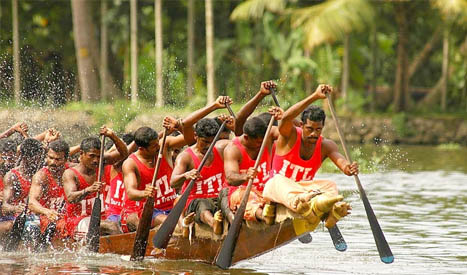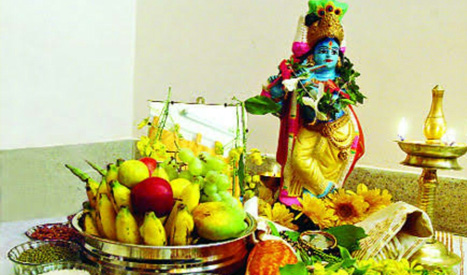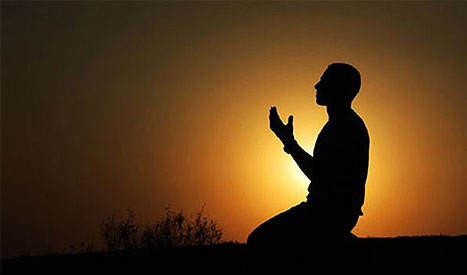Kerala is a land of colourful festivals, which have a long history and tradition behind them. Kerala's innumerable festivals however stand out because of their uniqueness.
Onam
Onam is the most famous festival of Kerala. All Malayali's irrespective of religion celebrates it. It falls in the Malayalam month of Chingam (Aug-Sept). It is the harvest festival of Kerala. Legend states that Onam is celebrated as the home coming of Mahabali, the king who ruled over Kerala in the age of plenty and was pushed down to the infernal regions (Patala) by Lord Vishnu in the form of Vamana.Onam is celebrated as a national festival of Kerala. It synchronizes with the tourist week celebration, which starts formally on the day of Atham asterism. The image of Thrikkakara Appan (Vishnu in the form of Vamana) is installed in every Hindu home during the Onam season. Children go around collecting flowers and decorate t hem in the front portion of the house in various designs and patterns. The most important days of the Onam festival are Uthradom and Thiruvonam days. On the latter, a grand feast is held in every home. Onam also provides an occasion for family get-together among the Keralites. It's a perfect example for the religious harmony of the state.
Vallamkali or Boat Races
This is a typical keralite festival of boat races. It is held in August in the Punnamada Kayal, which commemorates the visit of former Prime Minister, Late Jawaharlal Nehru to Alleppey. Similar boat races are held also at Aranmual and Champakulam, which has a religious significance. The later commemorates an episode involving the idol of Sri Krishna, which was lifted from Kurichi by the Chempakasseri Raja's men for consecration in the Ambalapuzha. The idol had to rest in the house of a Syrian Christian at Chempakulam. Therefore, even today the flag and coir rope required for the Chempakulam boat race is supplied from the local Kallurkad Church.Hindu Festivals Vishu
The first month of Malayalam Calendar is Medam (April-May) and the first day of Medam is celebrated as Vishu, the New Year day. Begin an auspicious day; it is a common belief that the fortune of the coming year depends on the first day. So the first day begins with ceremony of Kani Kanal, which literally means first sight. At the dawn, the Malayali's begin the first day of the Year by waking up in front of Kani. The Kani includes gold ornament, white cloth, a measure of rice or paddy, bell metal mirror, flowers of the Konna tree (Cussia fistula), halved jack fruits, halved coconuts, yellow cucumber, and two standing oil lamps emitting sparkling light their eyes. Another interesting features of this day are Kaayi neetal where the elder members in the family gift money to the younger ones.Mahasivarathri
Hindus celebrate Mahasivarathri, all over the world in Kumbam (Feb-March). It commemorates the day on which Lord Shiva consumed the deadly poison (Kalakuda visham) to save the world from destruction. The offering of special pooja and abhishekhams, and the presentation of cultural programmes in all the Shiva temples celebrate the day. The annual Sivarathri festival held on the banks of River Periyar at Alwaye, is one of the most spectacular local festivals of Kerala, which attracts thousands of pilgrims from all over the state. It has been compared to the Kumbamela at Prayag.
Navarathri
Literally Navarathri means Nine nights. This festival is celebrated for Navagraha Naayagi (Nine nymphs). It is called by different names in different parts of India. In Karnataka, it is called Dasara, in Bengal - Kali Pooja and in this state it is known as Saraswathy Pooja. Saraswathy is known as goddess of Knowledge. On this day all tools and books are kept for Pooja. Children who are to begin their schooling are made to write the first alphabet in rice with their finger.
Asthami Rohini
The birthday of Lord Krishna is celebrated with great importance on this day. It is held in the month of Chingam (Aug- Sept). Devotees visit the Krishna temples where special Pooja and cultural programmes are held.
Thrikarthiaka
This festival is celebrated in the month of Vrischikam (Nov -Dec). Display of light in the evening is a unique part of the festival.
Thiruvathira
Thiruvathira falls on the month of Dhanu (December-January) and is a women's festival. It commemorates the death of Kamadeva, the cupid of Hindu mythology. The aim of the celebration is conjugal harmony and happiness. The dance form Thiruvathirkkali is associated with this celebration.
Pooram Festival - Meenum (March-April)
Sabarimala Festivals - Vrishikam (November-December)
Ashtami at Vaikom - Kumbham (February-March)
Thrissur Pooram - Medam (April-May)
Christian Religious Festival
Christmas
All Christians celebrate Christmas as the birthday of Jesus Christ on 25th Dec. Holy Mass is held in all the churches in the state. Carol singing, setting up of Christmas tree in all churches and homes, exchanges of cards and receiving gifts from Santa Claus are all integral part of the festivities associated with the birth of Jesus Christ. There is a feast in every Christian home with meat as a special item, and the celebrations of Christmas leave good memories in every heart.
Easter
This is another important festival of Christians, which commemorates the resurrection of Jesus Christ. Easter usually falls in March-April, after 40 days lent of fast and penance. Christians go for mid-night mass, as a memory of the resurrection of Jesus, 2000 years ago.
Other Christian Festivals
St.George's Church, Edathwa - 27 April to 7th May
St.Sebastian's Church, Arathungal - 20th January to 31st January
St George's Church, Aruvithura - 22nd to 24th April
St Thomas Shrine, Malayattur - Last week of March or first week of April
St Mary's Orthodox Church, Manarcad - Sepember 1st to 9th
Parumala, Mannar
Maramon Convention
Muslim Religious festivals
Bakrid
The Bakrid commemorates Ibrahim's (Abhraham) offering of his only son as a sacrifice in obedience to God's command. The Muslims enjoy hearty feasts on Bakrid day. The rich may sacrifice a he goat or a bullock and distribute it among Friends, relatives and the poor. The famous Haj is performed after the celebration of Idul Azha. Idul Fitr Idul Fitr is celebrated after the conclusion of the Ramzan fast when Muslims give up all kind of food and drink during the day and spend the major part of the night prayer. Miladi Sharif Miladi Sharif, celebrated on a large scale in April, Commemorates the birth of the prophet. This celebration has acquired its present dimensions only in recent times. Previously the day was observed by the Muslims by reading what is commonly known as Maulud which is a short treatise in Arabic celebrating the birth, life, work and sayings of the prophet or some saint.
Muharram
Muharram is another festival celebrated by Muslims on the 10th day of Muharram the forbidden month, which marks the beginning of the Hijra year.
Chandankudam at Beemapally
The Chandankudam at Beemapally near Thiruvananthapuram is one of the most colourful of Muslim festival in Kerala. It is said to be the death anniversary of Beema Beeevi, a devout pilgrim lady who came to Kerala from Mecca. The festival begins on the 1st of Jamadul Akhar of the Hijira Era (October) and lasts ten days. Carrying earthen posts smeared with sandal wood paste and the mouth of the pot tightly closed with a Jasmine garland around the edges, thousands of pilgrims go around the mosque and the hallowed tomb of the devout lady in procession. Then the earthen port with money is placed at the tomb as an offering.
Local FestivalsJarram Nercha - Thervath Mosque, Pallanchathanur Nercha Festival - Ottapalam Mosque Jarram Nercha - Theruvath Mosque Malappuram Nercha - Malappuram Mosque Kodikuthu Festival - Kanjiramattom Mosque Chandanakkudam Festival- Beemapalli, Thiruvananthapuram




